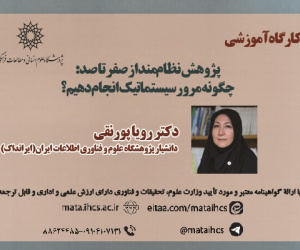رابطه بین منبع کنترل، میزان تحصیلات، سرمایه اجتماعی، سنوات خدمت و رضایت شغلی معلمان دبیرستان (مقاله علمی وزارت علوم)
درجه علمی: نشریه علمی (وزارت علوم)
آرشیو
چکیده
معلمان می توانند تأثیرگذارترین افراد جامعه باشند و رضایت شغلی می تواند در زندگی شخصی آنها تأثیرگذار بوده و کیفیت کاری شان را بالا ببرد. هدف این پژوهش مطالعه رابطه بین منبع کنترل، میزان تحصیلات، سرمایه اجتماعی و سنوات خدمت بر رضایت شغلی بوده است. روش تحقیق توصیفی و از نوع هم بستگی بود. جامعه آماری تحقیق، 340 نفر از معلمان دبیرستان شهرستان آران و بیدگل بود. نمونه آماری بر اساس نرم افزار G*power 85 نفر در نظر گرفته شد. استراتژی نمونه گیری به صورت تصادفی ساده بود. پرسش نامه استاندارد سرمایه اجتماعی ناهاپیت و گوشال، پرسش نامه منبع کنترل راتر و پرسش نامه رضایت شغلی ساتور استفاده شد. به منظور جمع آوری داده ها آلفای کرونباخ پرسش نامه ها که به روش مطالعه آزمایشی، روی 30 نفر اجرا شد به این ترتیب به دست آمد: پرسش نامه استاندارد سرمایه اجتماعی 944/0، پرسش نامه منبع کنترل 846/0 پرسش نامه رضایت شغلی 885/0. نتایج آزمون تی تک متغیره نشان داد که میانگین منبع کنترل درونی 44/12 بوده است که از عدد 9 نقطه برش پرسش نامه، بالاتر بوده که نشان دهنده منبع کنترل بیرونی معلمان در مدارس بود. همچنین میزان سرمایه اجتماعی و رضایت شغلی، بیشتر از نقطه برش 3 در پرسش نامه بوده که نشان دهنده وضعیت مطلوب سرمایه اجتماعی و میزان رضایت شغلی در بین معلمان بوده است. یافته های تحقیق نشان داد که تنها سرمایه اجتماعی بر متغیر رضایت شغلی اثرگذار بوده و 4/24 درصد از تغییرات رضایت شغلی توسط سرمایه اجتماعی در مدل توجیه می شود. در نتیجه معلمانی که دارای ارتباطات اجتماعی قوی در جوامع حرفه ای خود هستند به دلیل افزایش حمایت، همکاری و منابع مشترک، سطوح بالاتری از رضایت شغلی را تجربه می کنند.The Relationship between Locus of Control, Level of Education, Social Capital, Years of Service and Job Satisfaction of High School Teachers
Teachers can be the most influential individuals in society, and job satisfaction can impact their personal lives and improve their work quality. The aim of this research was to study the relationship between locus of control, education level, social capital, and years of service on job satisfaction. The research method was descriptive and correlational. The statistical population included 340 high school teachers from Aran and Bidgol County. The sample size was 85 (determined using G*power software). The sampling strategy used was simple random sampling. Standard questionnaires for social capital by Nahapiet and Ghoshal, locus of control by Rotter, and job satisfaction by Sator were used. To collect data, Cronbach's alpha for the questionnaires, obtained through a pilot study on 30 individuals, was as follows: social capital questionnaire, 0.944; locus of control questionnaire, 0.846; and job satisfaction questionnaire, 0.885. The results of the one-sample t-test showed that the average internal locus of control was 12.44, higher than the cutoff score of 9, indicating an external locus of control among teachers. Additionally, the levels of social capital and job satisfaction were above the cutoff score of 3, indicating favorable conditions for social capital and job satisfaction among teachers. The findings revealed that only social capital significantly affected job satisfaction, explaining 24.4% of the variations in job satisfaction in the model. Consequently, teachers with strong social connections in their professional communities experience higher levels of job satisfaction due to increased support, collaboration, and shared resources.






